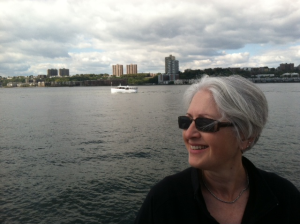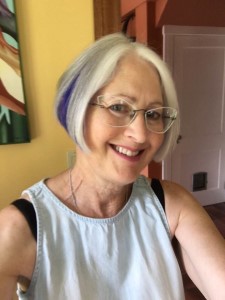About
The Short, Official Bio
I’m the author of nine novels for adults and young adults, including the Way of Arata epic fantasy duology (The Burning Land and The Awakened City) and Passion Blue and Color Song, a pair of historical novels for teens. In addition, I’ve written a handful of short stories, hundreds of book reviews, and a number of articles on writing and publishing that have appeared in Writer’s Digest, among others. In 2006, I served as a judge for the World Fantasy Awards.
I’m co-founder, with Ann Crispin, of Writer Beware, a publishing industry watchdog group sponsored by the Science Fiction and Fantasy Writers Association (SFWA) that provides information and warnings about the many scams and schemes that threaten writers. I received the Service to SFWA Award in 2009 for my work with Writer Beware.
I live in Amherst, Massachusetts.
The Longer, Less Official Bio
I was born in Exeter, New Hampshire. My father, a university professor, was very successful in obtaining research grants and guest professorships–during my childhood and adolescence we never lived in one place for more than a couple of years at a time. In addition to several U.S. states, I’ve lived in Ireland, England, and Germany, and traveled throughout Europe.
I graduated from Vassar College with a degree in Comparative Religion–which didn’t do a lot to help me find a conventional job, but did satisfy my fascination with world belief systems, an interest that’s strongly reflected in my writing.
For several years I supported my writing habit through a variety of dull, poorly-paid, and sometimes horrible jobs (the weirdest was probably my stint as a research assistant/housekeeper/dogsbody for an egomaniacal self-help author whose elderly husband spent much of his time in the basement with his huge collection of Hustler magazines). Eventually I wound up as the financial manager of a not-for-profit corporation–a very odd place for a “D” math student to find herself. In 1999 I happily left the world of offices and salaries behind to become a full-time writer.
My first novel, a young adult historical called The Lady of Rhuddesmere, was published in 1982. Two more YA books followed: Worldstone, a parallel world fantasy with a contemporary setting, and Guardian of the Hills, a historical fantasy that takes place during the Depression.
I switched to the adult market for a pair of duologies: The Arm of the Stone and The Garden of the Stone, high fantasies set on an alternate Earth where technology is outlawed; and The Burning Land and The Awakened City, epic fantasy adventures with topical themes of political oppression and religious terrorism.
Most recently, I’ve returned to my YA roots with Passion Blue and Color Song, a pair of historical novels set in fifteenth century Padua and Venice, about a talented girl’s struggle to become a painter in defiance of the rigid social conventions of her time.
My other writings include book reviews (published in Fantasy magazine Black Gate, and SF Site), a handful of short stories (I’m a contributor to the Cast of Characters anthology edited by Lou Aronica), and a number of articles on writing and publishing that have appeared in venues such as Writer’s Digest and Romance Readers Report.
I’m also co-founder, with my late friend and colleague Ann Crispin, of Writer Beware, a publishing industry watchdog group sponsored by the Science Fiction and Fantasy Writers Association. Writer Beware works to educate writers about the perils of the publishing industry, in part by documenting, exposing, and raising awareness of the huge variety of literary schemes and scams. I created the Writer Beware website, and maintain the very active Writer Beware blog and Facebook page.
I live in Amherst, Massachusetts, with my wonderful husband Rob (who doesn’t understand my need to write, but fully supports it). I’m a keen flower gardener, a voracious and eclectic reader, an enthusiastic hiker and biker, a film buff, and a bit of an exercise and nutrition nut.
I also spend far too much time online. In keeping with that, you can find me on Facebook and Twitter.
How I Became a Writer
My mother is a published author. Her novel, a Southern gothic called Laurel, was published when she was 23; it got a rave review in the New York Times and was made into a TV movie.
Even so, while I don’t remember a time when I didn’t write–poems and stories as a child, a few semi-serious short fiction efforts in high school as part of an honors English course–it never occurred to me that I might follow in my mother’s footsteps. Writing was just a hobby, something I did for fun.
That all changed the year I was 17.
I’d just graduated from high school. My father had gotten yet another research grant and my family was traveling to Germany; I wanted to defer my college admission and go along. My parents were fine with the idea of a gap year, but they weren’t about to let me loll around reading books and absorbing culture, which is what I really wanted to do. Either I had to attend school (not likely, since I couldn’t speak a word of German) or come up with some sort of worthy project to keep me busy.
“OK,” I said. “I’ll write a novel.”
Did I honestly think I could just sit down and bang out a book, when I’d never been even remotely serious about writing, and the longest thing I’d produced to date was a 30-page short story? No. It was a ploy to placate the ‘rents. I figured I’d do a few chapters–enough to demonstrate that I was trying–and then say I’d run out of inspiration and spend the rest of the year doing what I liked.
The joke was on me, though. By the end of the second chapter I was hooked; and before I was halfway through I knew I’d found what I wanted to do for the rest of my life. (I give my mother a lot of credit for not trying to talk me out of it.)
By the time I returned to the States to enter college, the book I’d never planned on completing had turned into The Lady of Rhuddesmere, and had been polished under my mother’s sharp editorial eye. In my spare time, I began playing the submission game. This wasn’t nearly so complex and confusing as it is now. There was less of everything–fewer publishers, fewer literary agents, fewer sources of information and vastly fewer ways to access them (basically, you went to the library). It was also a time when you could still submit to major publishers over the transom.
Which is what I did. Despite what I now realize was a truly awful query letter, I got a lot of manuscript requests. And a lot of rejections. After about two years of fruitless querying, Lady landed at a publisher that, unbeknownst to me, was preparing to close its doors. The editor who’d asked to see my book was planning to go out on her own as a literary agent, and offered to represent me.
My serendipitous new agent took the hassle of photocopying and mailing out of my hands (I do not miss those pre-digital days), but wasn’t initially able to improve things on the rejection front. She never gave up, though. Eight years after I finished Lady–long past the time when I’d abandoned any hope of a sale–she sold it to Frederick Warne, then an independent children’s publisher (it’s now an imprint of Penguin).
I will never forget the day she called to tell me about the offer. It was like a message from outer space. When I woke up the next morning, I was convinced I’d dreamed it.
My editor, Meredith Charpentier, was wonderful–caring, engaged, and meticulous. Over the next few months, I worked under her guidance to turn a flawed manuscript into a publishable novel. I completely rewrote the book (among other changes, Meredith asked me to switch from a third- to a first-person viewpoint), and then rewrote it again. It was a tough experience, and I had to put my ego on hold. But I learned more about writing and self-editing during those months of intensive work than I have before or since. I’m the writer I am today in large part because of Meredith.
There’s just one thing in my career journey that I regret. For about five years after I graduated from college, I stopped writing. I’d convinced myself that Lady would never sell, nor would the short stories I was dutifully turning out in order to hone my craft. I decided my hopes of a writing career were foolish, and made a conscious effort to set them aside. It’s unfortunately very easy for me to stop writing, since I find the process difficult and often unrewarding (I’m one of those writers who prefers editing to composing). But I’m not a whole person without it. Those were not happy years.
Would I have begun writing again, if Meredith hadn’t bought The Lady of Rhuddesmere? Honestly, I’m not completely sure. I had lost my faith in myself, and I don’t know if I would have been able to get it back without outside help.
But I hope so. I hope I would somehow have realized on my own what my career has taught me: that the effort is worth it, no matter what. That you can’t ask why you write, or what for–you just have to do it. That you never stop developing and changing, and that every book makes you better.
I try to remember that every day.
A Selection of Interviews
Wearing my Writer Beware hat at #BookMarketingChat on Twitter: How to Find Legit Publishers and Avoid the Bad Guys
Q&A with Kirkus Reviews about Renaissance art, astrology, and Passion Blue
Randy Dotinga of the Christian Science Monitor interviews me about Writer Beware
Advice for Writers interviews me about my books and writing
A podcast interview at Kobo Writing Life, mostly about Writer Beware and literary scams




